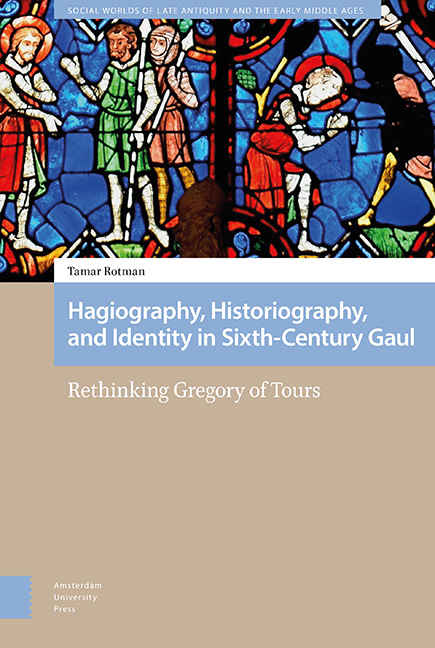Book contents
- Frontmatter
- Table of contents
- List of Abbreviations
- Acknowledgments
- Dedication
- Introduction
- 1 Gregory of Tours
- 2 ‘When the Saints Go Marching In’: Eastern Saints in Merovingian Gaul
- 3 The Miraculous History of Gregory of Tours
- 4 ‘By Romans They Refer To…’ (Romanos Enim Vocitant): History, Hagiography, and Identity
- Conclusion
- Bibliography
- Index
4 - ‘By Romans They Refer To…’ (Romanos Enim Vocitant): History, Hagiography, and Identity
Published online by Cambridge University Press: 16 December 2021
- Frontmatter
- Table of contents
- List of Abbreviations
- Acknowledgments
- Dedication
- Introduction
- 1 Gregory of Tours
- 2 ‘When the Saints Go Marching In’: Eastern Saints in Merovingian Gaul
- 3 The Miraculous History of Gregory of Tours
- 4 ‘By Romans They Refer To…’ (Romanos Enim Vocitant): History, Hagiography, and Identity
- Conclusion
- Bibliography
- Index
Summary
Writing history has always been much more than a simple recording of the past. Any historiographical document, including this book, reflects the choices and views of its author. It is the historian who selects her or his sources and it is the historian who decides how to analyze and present them. Likewise, the historian can tailor her sources to suit her narrative. In this way, Gregory of Tours was no different from any other historian and getting a sense of his goals might help us to better grasp his work.
Every historiographical work ought to be examined against the broader context in which it was written, be it a cultural, political, social, or literary one. The previous chapter, for instance, examined the literary context in which Gregory's Histories and hagiographical collections were written. Other factors, too, affected Gregory's writing and, in this chapter, I intend to examine one of them, namely, the identity crisis of the post-Roman period. As noted in Chapter 2 with reference to the Gallic stylite Vulfilaic, the dissolution of the Roman Empire led to many institutional changes, among them the rise of holy men in the East and the establishment of episcopal authority in the West. The radical transformation of the Roman world also led to a supposedly crisis of self-perception among the population of this vast area. Were they still Romans? Gauls? Franks? Christians? Gregory's historiographical and hagiographical works were written during these confusing times, they responded to this crisis, and through them Gregory was able to construct a particular Gallo-Christian identity for his audience.
Identity is a multifaceted concept. It does not have a single definition, it has many variations and expressions, and there are plenty of factors that affect its definition. Identity, then, is a fluid term and its definitions depend on historical, cultural, political, and geographical contexts. Since it is such a complex concept, identity helps scholars to broaden their understanding of societies and human interactions. In the words of Walter Pohl, identity is ‘the result of serial acts of communication and interaction’. Thus, identity emerges as an important prism through which to view history, which is likewise a series of communications and interactions.
- Type
- Chapter
- Information
- Hagiography, Historiography, and Identity in Sixth-Century GaulRethinking Gregory of Tours, pp. 129 - 166Publisher: Amsterdam University PressPrint publication year: 2021



